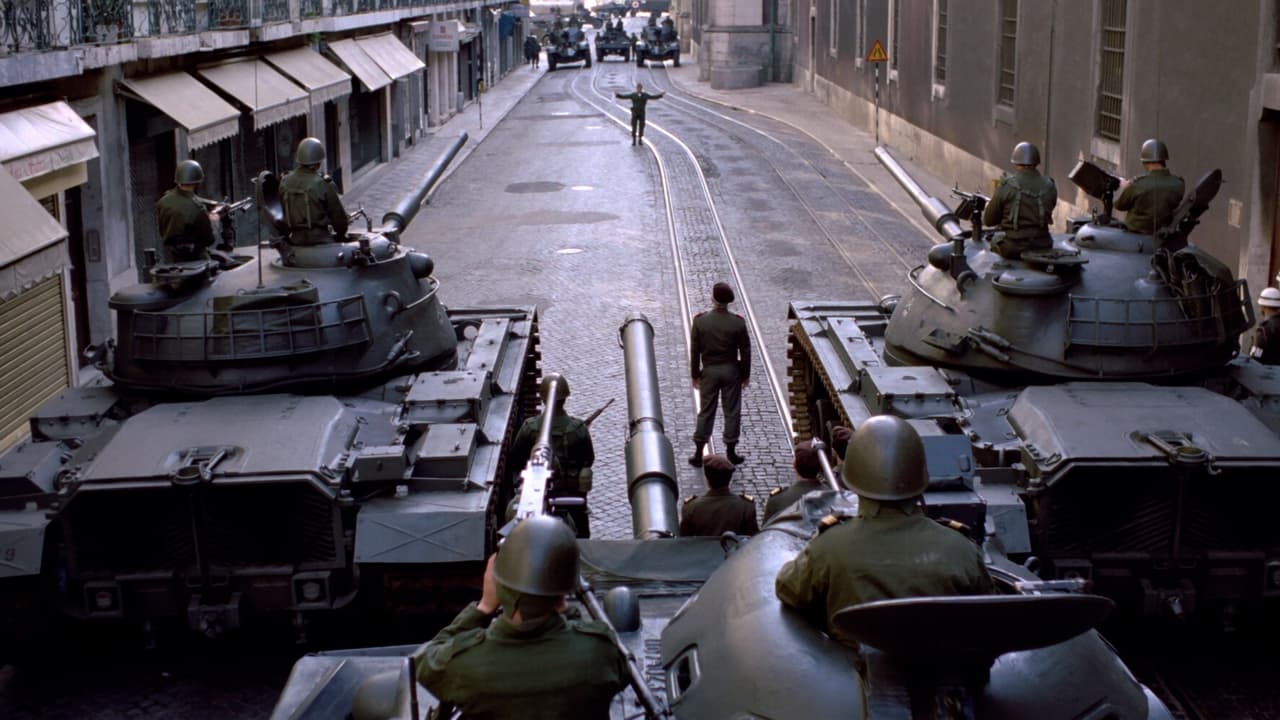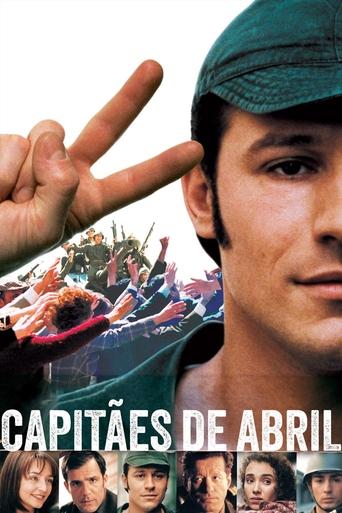

The events that led to the elimination of the long and cruel dictatorship of Salazar in Portugal in April of 1974, are examined in this ambitious film directed by actress Maria de Medeiros. The screen play is a collaboration by Ms. de Medeiros and Eve Deboise. The story is both women's interpretation of what occurred in the country since the director was only 9 years old that fateful April.The film pays tribute to the men that plotted the coup and the way they conducted themselves throughout the ordeal. The "Carnation Revolution", as it was baptized by the media, was an example restraint as there was no bloodshed during the days when it was happening, or in the days following, which brought Portugal to a democracy that had been denied to its citizens by a cruel dictator.The main point of contention with the military men in charge of the coup was to correct the abuses Portugal had inflicted in the colonies in Africa, where they had been responsible for the deaths of countless of natives that wanted to get rid of the invaders. At the same time, many of Portuguese soldiers died during the wars that were waged overseas.The basic problem with the story, the way it's told on the screen, is a weak screen play that doesn't fully make sense of most of what the viewer is watching. If the viewer doesn't have a certain background about what is going on, he will be lost by what the writers of the picture decided to focus the action on. There is also a problem with the action, which at times, has a flat feeling to it that renders some moments as static and meaningless.This film will resonate with Portuguese, of course, because it marked the beginning of the actual democracy. Maria de Medeiros should have served the film better either by staying behind the camera, or letting some other director be in command. Stefano Accorsi, a fine Italian actor, is the best thing in the film as Maia. Joaquim de Almeida's Gervasio is a puzzle at best. When we first meet him, he appears to be in favor of the uprising, then changes his mind, only to come back on board again. This duality in his character doesn't help in the over all narrative. The same go for Frederic Pierrot, who plays Manuel, Antonia's husband. Fele Martinez, the Spanish actor, has little to do.While the film is entertaining, another treatment for the story would have made a better and stronger movie. One wishes Maria de Medeiros to succeed. Perhaps the next time she will be better prepared to give her viewers a tighter and more controlled story.
... View MoreA true story about a true revolution, 25 of April ; a revolution against a repressive regime of 41 years, that was imposing a colonial war on it's military's, for maintaining an empire (Angola, Mozambique, Guine-Bissau, Cabo Verde, S. Tomé e Principe; the first and the last of the great colonial empire's of Europe) of 600 years, since it's beginning in the conquest of Ceuta in 1415; a revolution by the army for the people, and for a democratic Portugal; the most's surprising fact in this revolution is that it were no people killed in it (except those that died in the hand's of PIDE, the political police of the State, during a brutal gunfire against an unarmed crowd protesting in front of it's headquarters in the day of the revolution, in 25 of April 1974, has it show's on the film).And has all revolutions it has it's heroes, one them of was Captain Salgueiro Maia, a returned soldier from the war, whose convictions along with the rest of the army, was that they were fighting (since 1961) a hopeless war, and that sometimes a soldier has to disobey it's country.
... View MoreProbably the first Portuguese film I have seen in my life, and I enjoyed it. The plot is related of how the young army officers took the power in Portugal in 1974, to finally defeat the fascist government of Caetano and to also finalize the wars in the colonies, i.e. Mozambique, Angola, and Guinea (Bissau)- Cape Vert. Most of the events shown in the film reflect with exactitude the behavior of the army officers and soldiers to conduct the coup, of the oppressed people, who were very happy with this new development and the liberty, the resistance of Caetano's men, and also in a subtle way of most conservative officials, including Spinola, who took over as the new president. The Portuguese revolution can be remembered because of the action of several young officers, but for me the most interesting part of the film was when the young captain expressed that Portugal should develop itself democratically, and this is what the country achieved some years after this coup or revolution. The film also shows that the army officers and soldiers never wanted to kill anyone; even the most serious enemies were respected at the end.
... View More9/7 8:45 pm APRIL CAPTAINS (**** out of a possible 5)Excellent, if slightly overlong film about the Portuguese coup d'etat in 1974. Best Line: "Coup d'etat. Can we come in?" The humor was a welcome surprise. Spoke with writer/director Maria de Medeiros afterwards. She was very sweet and lovely and asked me to "salute my mother" for her since they met recently in Avingnon.
... View More